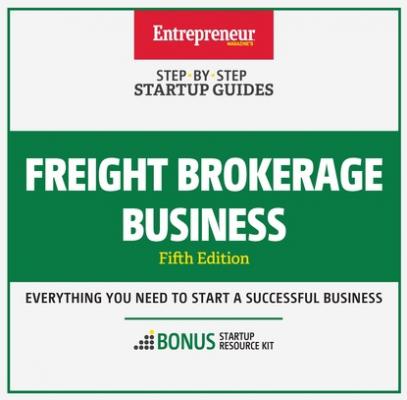Freight Brokerage Business. The Staff of Entrepreneur Media, Inc.
Читать онлайн.| Название | Freight Brokerage Business |
|---|---|
| Автор произведения | The Staff of Entrepreneur Media, Inc. |
| Жанр | Малый бизнес |
| Серия | Startup Guide |
| Издательство | Малый бизнес |
| Год выпуска | 0 |
| isbn | 9781613083611 |
email: [email protected]
RJW Transport, Inc.
Ronald Williamson, CTB
(630) 424-2400, fax: (630) 424-7251
11240 Katherine’s Crossing, Suite 400, Woodridge, IL 60517
Tucker Company Worldwide, Inc.
William J. Tucker
(800) 229-7780, (856) 317-9600, fax: (856) 317-9699
56 North Haddon Avenue, Haddonfield, NJ 08033
The following is an alphabetical listing of common terminology used by freight brokers and agents. The best way to develop a true understanding of these terms is to obtain some type of specialized training as a freight broker or agent, and/or land a job that will provide you with real-world experience working within the industry.
Accessorial charges: charges assessed by a carrier for services provided in addition to basic transportation, such as extra pickups, loading, and unloading.
Air-ride: trailers built to reduce road shock and designed to carry fragile items; the suspension system supports the load on air-filled rubber bags rather than steel springs.
Backhaul: the return trip of a vehicle from the destination back to the origin.
Bill of lading: a document that serves as the contract of carriage between the shipper and the carrier.
Bobtail: a tractor operating without a trailer.
Bracing: securing items inside a vehicle to prevent damage.
Break-bulk: the separation of a load into smaller shipments for delivery to ultimate consignees.
Claim: a charge made against a carrier for loss, damage, or overcharge.
Class rate: a rate constructed from a classification and a uniform distance system.
Commercial zone: the area surrounding a city or town to which rates quoted for that city or town also apply.
Common carrier: any person or agency publicly engaged in the business of transporting passengers or freight; common carriers are subject to two stringent obligations: compulsory service and liability for loss or damage to goods.
Consignee: the receiver of a freight shipment, usually the buyer.
Consignor: the sender of a freight shipment, usually the seller.
Consolidation: the collection of smaller shipments to form a larger quantity to get lower transportation rates.
Container (shipping container): standard-sized rectangular box used to transport freight by ship, rail, or motor carrier.
Contract carrier: a company that transports freight under contract with one shipper or a limited number of shippers.
Cost per hundredweight (cwt): an amount charged per hundred pounds of freight.
Density: a physical characteristic of a commodity, which is important in rate-making since density affects vehicle utilization; determining density requires measuring its mass per unit per volume, or pounds per foot.
Detention: the charge assessed by the carrier when the shipper or receiver holds a truck or trailer beyond the time allowed for loading and unloading.
Doubles (twins, twin trailers): a tractor and two semitrailers that are connected.
Drayage: a motor carrier that operates locally, providing pickup and delivery service.
Driver assist: when a driver is asked to assist in the loading or unloading process; sometimes treated as an extra charge on a per-hour or flat rate.
Driver’s log sheets: a log of miles traveled, hours of driving, off-times, and rest periods that drivers are required to keep.
Dry van: a nonrefrigerated, noninsulated semitrailer handling general commodity freight that can withstand outside temperatures without suffering damage.
Empty backhaul: when a truck returns empty from the destination to the point of origin and therefore does not generate return-trip revenue.
Exclusive use: a request made by shippers that means their freight is the only freight on the truck.
Exempt carrier: a for-hire carrier that is exempt from economic regulations.
Expediting: determining where a shipment is during transit and attempting to speed up its delivery; many big companies have expeditors on staff who do this full time.
Flats (or flatbeds): a flat, solidly built trailer designed to handle heavier and bulkier loads than a dry van, such as metal, equipment, and machinery.
FOB: a term of sale that defines who is to pay transportation charges for a shipment, who is to control the movement of the shipment, or where title to the goods passes from the seller to the buyer; originally an acronym for “free on board.”
For-hire carrier: a company that provides truck transportation of cargo belonging to others and is paid for doing so.
Freight bill: the carrier’s invoice for transportation charges for a particular shipment.
Freight broker: the middle person who connects shippers and carriers.
Freight payable: technically, a freight bill that needs to be paid; in common use, it also refers to the special payables department large shippers may have that is dedicated to paying freight bills.
Freight pool: a collection of trailer loads waiting for assignment to a driver and tractor.
Front haul: the initial movement of the vehicle from the origin to the destination.
Full truckload (FTL): a shipment occupying the entire trailer, typically with a weight of 30,000 pounds or more.
Gross weight: the total weight of the goods being shipped, including packing and packaging materials.
Hazmat: Hazardous materials, as classified by the U.S. Environmental Protection Agency (EPA); transportation of hazardous materials is strictly regulated by the U.S. Department of Transportation.
Incentive rate: a rate designed to encourage shippers to ship heavier volumes per shipment.
Interline: two or more motor carriers working together to haul a shipment.
Intermodal: combining two or more modes of transportation, such as truck and rail, truck and air, or rail and ocean.
Interstate Commerce Commission (ICC): a federal regulatory agency that was abolished in 1995.
Joint rate: a rate over a route that involves two or more carriers transporting the shipment.
Just-in-time
